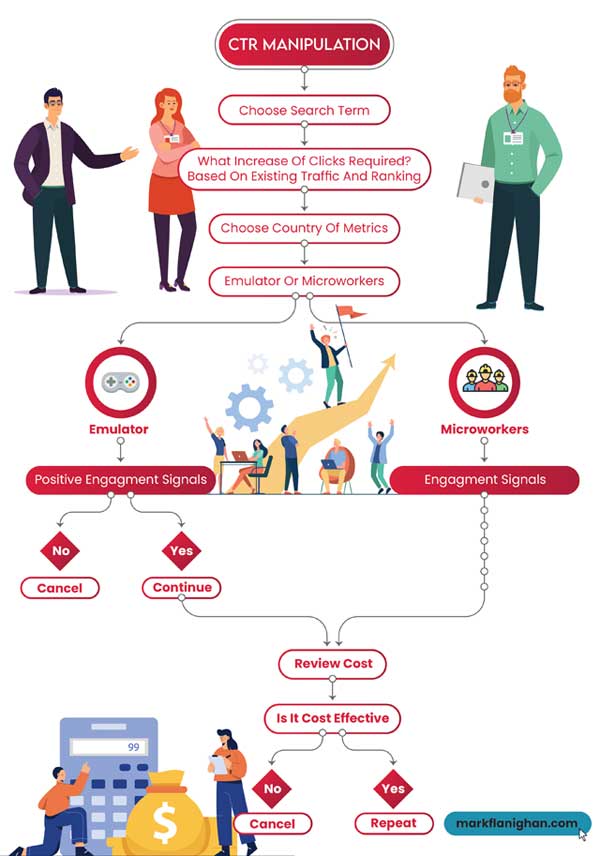LinkDaddy CTR Manipulation: Professional Solutions to Increase Your Click-Through Fees
LinkDaddy CTR Manipulation: Professional Solutions to Increase Your Click-Through Fees
Blog Article
Exploring the Relationship In Between CTR Adjustment Services and User Actions
In the realm of digital advertising, the influence of click-through price (CTR) manipulation services on customer habits remains a facility and interesting subject. By dissecting the intricate connection between CTR manipulation solutions and user behavior, interesting insights arise that might reshape our understanding of digital marketing strategies and their results on customers.
Impact of CTR Adjustment on Behavior
Examining the impact of Click-Through Rate (CTR) manipulation on individual habits reveals important understandings into the characteristics of online involvement. CTR manipulation entails unnaturally inflating the variety of click a certain web link or promotion to trick users and search engines. This technique can cause an altered understanding of a page's popularity or importance, inevitably affecting customer actions.

Moreover, CTR adjustment can skew the information used by algorithms to personalize individual experiences. This can lead to users being served web content that does not line up with their choices or interests, ultimately resulting in a decline in individual contentment and engagement. Understanding the impact of CTR manipulation on individual actions is essential for keeping transparency and count on on the internet communications.
Customer Engagement With Controlled CTR
Customer engagement with controlled CTR information frequently leads to skewed understandings of on the internet web content appeal and relevance. When users interact with content based on synthetically filled with air Click-Through Rates (CTR), they might believe that certain info, products, or solutions are more preferred or credible than they in fact are. This can cause individuals choosing based on misleading information, resulting in potentially negative outcomes.
Engagement metrics like sort, shares, comments, and time spent on a web page are typically affected by CTR control. Individuals might be extra likely to involve with content that appears to have higher engagement rates, even more continuing the cycle of skewed assumptions. Because of this, content developers and marketers might focus on producing material that generates high CTR as opposed to concentrating on developing really important and pertinent product.

Emotional Impacts of CTR Control

Moreover, the mental effects of CTR adjustment can also show up in transformed decision-making processes. Users might be a lot more inclined to click material solely based on its regarded popularity, instead than its actual worth or importance to their demands. This behavior shift can cause a superficial engagement with online web content, where customers may neglect premium yet much less preferred offerings for those with synthetically enhanced CTRs.
In essence, the emotional implications of CTR manipulation highlight the relevance of keeping transparency and authenticity in on imp source the internet communications to promote genuine customer interaction and count on.
Moral Considerations in CTR Manipulation
Thinking about the moral effects of controling click-through prices (CTR) in online systems is critical for maintaining honesty and trust fund within the electronic ecological community. CTR manipulation increases worries concerning tricking individuals, misshaping data analytics, and endangering the trustworthiness of on-line content. One significant ethical consideration is the potential effect on individual autonomy and decision-making. By synthetically inflating CTR, individuals may be misinformed right into clicking links or ads they would not have actually selected otherwise, leading to an insincere online experience. CTR manipulation can skew the efficiency metrics that services depend on to make tactical choices, ultimately influencing market competitors and her response customer depend on.
One more moral element to consider is the justness of manipulating CTR to acquire an unreasonable advantage over competitors. Involving in such practices not only goes against concepts of fair game yet likewise undermines the trust fund that users position in on-line systems. It is important for companies and digital marketing experts to maintain moral requirements in their techniques to ensure transparency, integrity, and long-lasting sustainability in the on-line environment.
Effects for Digital Advertising And Marketing
With the boosting dependence on digital systems for marketing purposes, the technique of manipulating click-through rates (CTR) poses considerable implications for the performance and stability of electronic advertising approaches. CTR adjustment can result in skewed information analytics, misguiding online marketers right into believing that their projects are executing far better than they actually are. This can result in misallocation of resources, with firms spending in underperforming techniques based on falsified CTRs. In addition, when users understand that CTRs have actually been adjusted, it can wear down count on the brand, leading to lasting unfavorable consequences for client commitment and brand online reputation.
Additionally, making use of CTR control solutions can this link develop an unfair competitive landscape, where business that participate in such methods get an artificial benefit over those that follow ethical marketing requirements. This can stifle technology and creativity in electronic marketing, as success becomes even more concerning adjustment techniques than delivering authentic worth to customers. Ultimately, the effects of CTR control for digital advertising and marketing expand past temporary gains, affecting the total sustainability and reputation of marketing efforts in the electronic realm.
Conclusion
Finally, the relationship in between CTR control solutions and individual actions is complicated and complex. The effect of CTR manipulation on actions, individual engagement with adjusted CTR, mental effects, moral factors to consider, and implications for electronic advertising all contribute fit this relationship. Understanding these dynamics is important for marketing professionals and scientists alike in order to browse the moral ramifications and optimize the efficiency of their digital advertising approaches.
Report this page